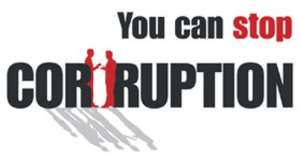
Citizens have been urged to abide by all legislations and policies introduced by government to combat corrupt activities in all sectors of the economy to promote faster growth and development.
Anti-graft campaigners believe some requirements of the laws are not being adhered to leading to widespread perceived corrupt practices in both private and public sectors of the economy.
The Deputy Upper West Regional Minister, Mr Amidu Chinnia Issahaku, told people who attended National Anti-Corruption Action Plan (NACP) meeting Wa this week, that government has introduced a number of legislations and policies which ought to be respected to achieve its purpose.
Ghana has, among other anti-corruption laws, introduced the Public Procurement Act and the Financial Management Act to tackle graft, which Mr Chnnia said: 'These laws are to ensure value for money expenditure and transparency in the public sector'.
The Deputy Minister further stated that in order to tackle corruption in both public and private sector.
The government has also introduced the National Anti-Corruption Action Plan (NACAP) which, he said has been approved by parliament for implementation and ought to be supported.
The action plan aimed at ensuring efficiency, accountability and transparency in the public and private sector.
Civil Society Organizations (CSOs), district and municipal assemblies, journalists and security agencies in Wa attended the one-day meeting organised by the Commission on Human Rights and Administrative Justice (CHRAJ) and Ghana Integrity Initiative (GII) in collaboration with Ghana News Agency.
Mr Chnnia said corruption was the cause of slow development in Ghana and Africa, hence there was the need to galvanise efforts to fight the canker that has rendered a number of people impoverished in the society.
Mr Richard Quayson, the Deputy Commissioner CHRAJ) advised CSOs and Media associate to engage actively with NACAP in a bid to fight corruption in the country.
It is estimated that Africa loses over $100 billion annually through corruption while Ghana alone loses $3 billion (GH¢13.8 billion) every year through corruption.
Mr Quayson said Ghana beyond Aid would not be a dream, but a reality if only government together with the citizenry were able to fight corruption.
The monies lost by Ghana annually if put into good use, he said, could improve the poverty level and enhance the economic situation of citizens.
Mrs Mary Awelana Addah, the Programmes Manager of GII, called on institutions and agencies to create corruption complain units to help do away with fraud.
She said the forum would help solicit support on the best modalities to fight the 'ugly monster'- corruption.




 Saglemi Housing Project will not be left to rot – Kojo Oppong Nkrumah
Saglemi Housing Project will not be left to rot – Kojo Oppong Nkrumah
 Transport fares hike: GPRTU issue two-day ultimatum
Transport fares hike: GPRTU issue two-day ultimatum
 ARC endorses Alan as presidential candidate – Buaben Asamoa
ARC endorses Alan as presidential candidate – Buaben Asamoa
 Akufo-Addo appoints Kwasi Agyei as new Controller and Accountant-General
Akufo-Addo appoints Kwasi Agyei as new Controller and Accountant-General
 PNC dismiss reports of mass resignations
PNC dismiss reports of mass resignations
 PAC advocates for revenue collectors to be engaged on commission basis, not full...
PAC advocates for revenue collectors to be engaged on commission basis, not full...
 Genser Energy commissions 110km of natural gas pipeline at Anwomaso
Genser Energy commissions 110km of natural gas pipeline at Anwomaso
 Naa Torshie calls for tolerance, peace ahead of 2024 election
Naa Torshie calls for tolerance, peace ahead of 2024 election
 Asantehene commends Matthew Opoku Prempeh for conceiving GENSER Kumasi Pipeline ...
Asantehene commends Matthew Opoku Prempeh for conceiving GENSER Kumasi Pipeline ...
 Let’s do away with ‘slash and burn politics’ in Ghana — Dr Adutwum
Let’s do away with ‘slash and burn politics’ in Ghana — Dr Adutwum
